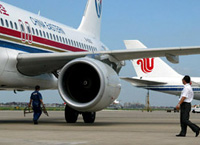
Profits for the civil aviation industry have fallen by almost half from last year amidst surging international crude oil prices.
According to statistics released yesterday by the General Administration of Civil Aviation of China (CAAC), the industry regulator, the sector earned a profit of 5.82 billion yuan (US$715 million) between January and November.
That figure was almost half of last year's 10.27 billion yuan (US$ 1.3 billion) for the same period.
Included in the profit was 2.61 billion yuan (US$321 billion) for airline companies, according to the statistics.
CAAC director Yang Yuanyuan said climbing jet fuel prices in the international market was one of the major reasons for the decrease in profits. He was speaking at the annual work conference of the civil aviation industry yesterday.
Jet fuel prices have been rising since June last year, from 3,400 yuan (US$410) per ton early last year to 5,220 yuan (US$643) per ton now. This has put pressure on airlines.
A 100-yuan (US$12) increase in jet fuel prices leads to a loss of 250 million yuan (US$30 million) in net profit, according to Yang Defeng, spokesman for the Guangzhou-based China Southern Airlines.
To offset the challenges caused by higher oil prices, the CAAC is allowing airlines to continue to levy jet fuel surcharges on domestic routes until March 31.
However, according to a report last week by researchers at the China Merchants Securities Co Ltd, jet fuel prices are estimated to stay at around 5,220 yuan (US$643) per ton in China next year.
The report concluded that fuel prices will continue to be an important factor influencing investment opportunities in the industry.
However, China will still add 142 new aircraft to its air fleet next year, said Yang.
Insiders said the announcement might lead to a new round of battles between aircraft manufacturers desperate to grab a share of the vast market, particularly US aviation giant Boeing and its European rival Airbus.
Currently, more than 770 aircraft are operated by the major Chinese airlines. The participation of more and more private players has increased demand for planes. Six private carriers have joined the competitive aviation market since the first private airline Okay Airways took to the skies last year, while others are still waiting for approval from CAAC.
"Furthermore, the nation plans to invest 26 billion yuan (US$ 3.2 billion) in infrastructure construction in the coming year, including 25 major projects such as the expansion of Beijing Capital International Airport and Shanghai Pudong International Airport," Yang said.
The CAAC estimated that the aviation industry in China is expected to carry 138 million passengers and 3.05 million tons of cargo and mail this year, an increase of 13.8 and 10.2 per cent respectively on last year.
"Investors are being encouraged to enter major fields like regional flights, cargo transport and general aviation next year," Yang said.
He said China will further expand market access to the industry and promote the opening of aviation rights to foreign airlines while intensifying international partnerships in the aviation sector.
(China Daily December 27, 2005)
|

